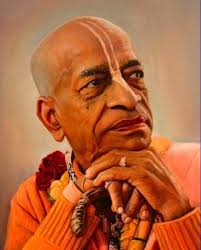This is not how Srila Prabhupada wants us to chant the Holy Names of God
At the recent Holy Name retreat at New Govardhana, Indradumya S and BB Govinda Swami were diving into the mosh pit and being tossed around. Just like rock stars.Then the Brahmacarini started doing summer salts in her Sari……….
Sahajarism is alive and well in the Australian yatra.
This is how Srila Prabhupada wants us to chant the Holy Names

quotes compiled by Yasoda nandan das
Madhya 8.312–purport--At the end of every chapter, the author admits the value of the disciplic succession. He never claims to have written this transcendental literature by carrying out research work. He simply admits his indebtedness to the notes taken by Svarūpa Dāmodara, Raghunātha dāsa Gosvāmī and other authoritative persons. This is the way of writing transcendental books, which are never meant for so-called scholars and research workers. The process is mahā-jano yena gataḥ sa panthāḥ: one has to strictly follow great personalities and ācāryas. Ācārya-vān puruṣo veda: one who has the favor of the ācārya knows everything. This statement made by Kavirāja Gosvāmī is very valuable for all pure devotees. Sometimes the prākṛtā sahajiyās claim that they have heard the truth from their guru. But one cannot have transcendental knowledge simply by hearing from a guru who is not bona fide. The guru must be bona fide, and he must have heard from his bona fide guru. Only then will his message be accepted as bona fide. Lord Kṛṣṇa confirms this in the Bhagavad-gītā (4.1):”The Supreme Lord said, ‘I instructed this imperishable science of yoga to the sun-god, Vivasvān, and Vivasvān instructed it to Manu, the father of mankind, and Manu in turn instructed it to Ikṣvāku.”
In this way the message is transmitted in the bona fide spiritual disciplic succession from bona fide spiritual master to bona fide student. Śrīla Kavirāja Gosvāmī therefore as usual concludes this chapter by reasserting his faith in the lotus feet of the six Gosvāmīs. Thus he is able to set forth this transcendental scripture, Caitanya-caritāmṛta.
Link to this page: https://prabhupadabooks.com/cc/madhya/8/312
Madhya 15.14 purport--Nityānanda Prabhu to be an ordinary human being is the business of mental speculators known as kuṇapātma-vādīs. These people accept the material body, which is a bag of three material elements (kuṇape tri-dhātuke), as themselves. They think that Nityānanda Prabhu’s body was similarly material and that it was meant for sense gratification. Whoever thinks in this way is a candidate for the darkest regions of hell. Those who hanker after women and money, who are self-interested and have the mentality of merchants, can certainly discover many things with their fertile brains and speak against the authorized revealed scriptures. They also engage in some moneymaking businesses to cheat innocent people, and they try to support their business programs by making such offensive statements. Actually Nityānanda Prabhu, being the expansion of Śrī Caitanya Mahāprabhu, is the most munificent incarnation. No one should consider Him an ordinary human being or an entity like the prajāpatis, who were ordered by Brahmā to increase generation. Nityānanda Prabhu should not be considered instrumental for sense gratification. Although professional so-called preachers support this, such statements are not found in any authorized revealed scriptures. Actually there is no support for these statements made by sahajiyās or other professional distributors of kṛṣṇa-bhakti.
Link to this page: https://prabhupadabooks.com/cc/madhya/15/42
Madhya 19.160 purport—The unwanted creepers have been described by Śrīla Bhaktisiddhānta Sarasvatī Ṭhākura. He states that if one hears and chants without trying to give up offenses, one becomes materially attached to sense gratification. One may also desire freedom from material bondage like the Māyāvādīs, or one may become attached to the yoga-siddhis and desire wonderful yogic powers. If one is attached to wonderful material activities, one is called siddhi-lobhī, greedy for material perfection. One may also be victimized by diplomatic or crooked behavior, or one may associate with women for illicit sex. Others may make a show of devotional service like the prākṛta-sahajiyās, or one may try to support his philosophy by joining some caste or identifying himself with a certain dynasty, claiming a monopoly on spiritual advancement. Thus with the support of family tradition, one may become a pseudo guru or so-called spiritual master. One may become attached to the four sinful activities-illicit sex, intoxication, gambling and meat eating, or one may consider a Vaiṣṇava to belong to a mundane caste or creed. One may think, “This is a Hindu Vaiṣṇava, and this is a European Vaiṣṇava. A European Vaiṣṇava is not allowed to enter the temples.” In other words, one may consider Vaiṣṇavas in terms of birth, thinking one a brāhmaṇa Vaiṣṇava, a śūdra Vaiṣṇava, a mleccha Vaiṣṇava and so on. One may also try to carry out a professional business while chanting the Hare Kṛṣṇa mantra or reading Śrīmad-Bhāgavatam, or one may try to increase his monetary strength by illegal means. One may also try to be a cheap Vaiṣṇava by chanting in a secluded place for material adoration, or one may desire mundane reputation by making compromises with nondevotees, compromising one’s philosophy or spiritual life, or one may become a supporter of a hereditary caste system. All these are pitfalls of personal sense gratification. Just to cheat some innocent people, one makes a show of advanced spiritual life and becomes known as a sādhu, mahātmā or religious person. All this means that the so-called devotee has become victimized by all these unwanted creepers and that the real creeper of bhakti-latā-bīja has been stunted.
Link to this page: https://prabhupadabooks.com/cc/madhya/19/160
SB 3.9.10 purport–A person in ignorance of the principles of religion who therefore does nothing in the matter of religion is far better than a person who misguides others in the name of religion without reference to the factual religious principles of devotional service. Such so-called leaders of religion are sure to be condemned by Brahmā and other great authorities.


